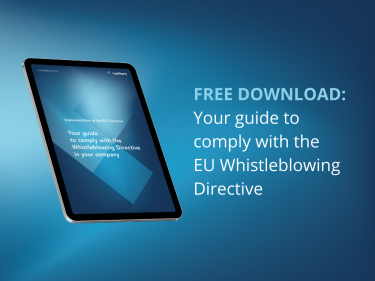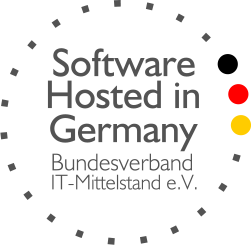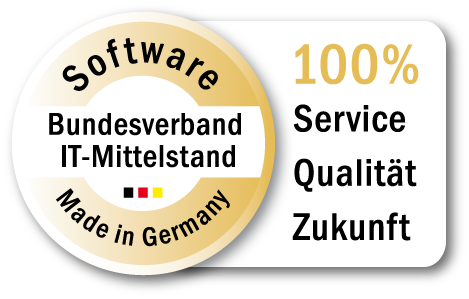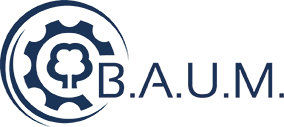What is the content of the Whistleblowing Directive?
The Whistleblowing Directive has already been adopted by the European Parliament in 2019, but it is becoming more relevant than ever right now. Since 16 December 2021, the German Federal Government has to submit a draft law for an integration of the Directive into German legislation.
The central content of the Whistleblower Directive is the creation of a company-internal infrastructure for reporting legal violations. The violations can concern different issues such as these:
- Corruption
- Competition law matters
- Consumer protection
- Data protection
- Environment & Animal Welfare
- Product safety
Whistleblowers should be given the opportunity to anonymously report legal violations and breaches of internal company guidelines.
Update: The Whistleblower Directive has come into force - what now?
The Whistleblower Directive has been in force in the EU since 17 December 2021. Other European countries such as Sweden or Denmark have submitted legislation in response to the Whistleblower Directive in due time. And Germany? The first draft law from the beginning of 2021 failed due to the opposition of the CDU/CSU. Since then, although it became clear from coalition negotiations after the Bundestag elections at the end of 2021 that a law to implement the Whistleblower Directive is a goal of the government’s work, Germany still finds itself without such a law at the beginning of 2022.
Germany’s failure to meet the deadline for implementing the Whistleblower Directive has resulted in the EU Commission launching infringement proceedings. The EU Commission has already filed an official complaint in this regard. A further postponement of the Whistleblower Protection Act may even lead to sanctions for Germany.
Despite Germany’s delay in implementing the Whistleblower Directive, one thing is clear: Germany will not be able to avoid passing a law on whistleblower protection. It is therefore advisable for companies to deal with the content of the Directive and the resulting requirements for implementation in companies. We would like to explain to you what it is all about.
What does the Whistleblower Directive mean for German companies?
The law, in response to the EU’s Whistleblowing Directive, will require companies to install internal reporting channels. In other EU countries, such as Sweden or Denmark, such a law has already been passed. The Whistleblowing Directive mandates that companies above a certain size (50 employees or more) must implement a whistleblowing system. The smaller companies with up to 249 employees will probably be obliged to protect whistleblowers with an extended deadline.
Who does the Whistleblowing Directive protect?
The central aim of the Whistleblowing Directive is to protect the so-called whistleblowers. This refers to the persons who make use of the whistleblowing systems and report incidents. The directive ensures that whistleblowers do not have to expect reprisals by protecting their identity. The persons to be protected in a company are not only employees, but also other stakeholders such as suppliers, partners or external supervisory bodies.
Which sanctions can be expected in case of non-compliance with the Whistleblowing Directive?
The Whistleblowing Directive foresees sanctions in case of non-compliance of companies. The specific consequences are left up to the respective countries. However, the sanctions should by no means be underestimated. With a view to the legal implementation of the Whistleblowing Directive in Poland, it is worth being well prepared for a law. The current Polish draft law includes a three-year prison sentence for managing directors of companies without a whistleblowing system.
Whistleblowing systems as a consequence of the new EU Directive
Whistleblowing systems are the digital answer to the Whistleblower Protection Act. Employees can report offences at any time. A review of the incidents by legally trained specialists ensures that the documentation complies with data protection requirements and that the consequences are adequate.
This is how a whistleblower system works:
- Observation of the incident
- Reporting in the system
- Review by independent experts
- Consequence of the violation
- Follow-up
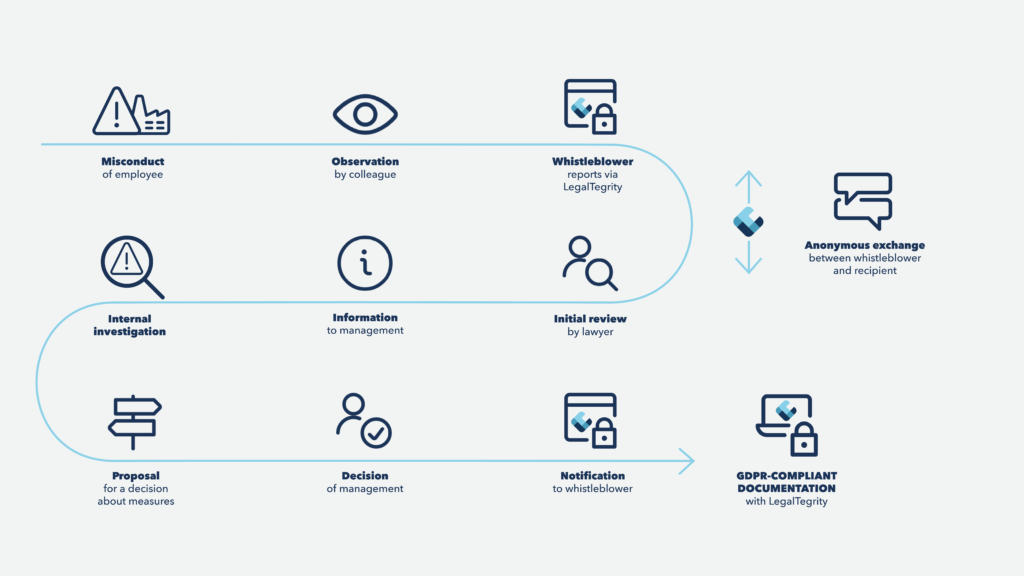
Whistleblowing Directive - an assessment from experts
All companies must adapt their compliance management!
“I firmly believe that all companies will have to adapt parts of their compliance management […],” says Dr Thomas Altenbach in an interview with IT Daily on the impact of the EU Whistleblower Directive on existing compliance management in companies.
The LegalTegrity CEO answered interesting questions like these in an interview with IT Daily (only available in German):
- Why should compliance also play an increasingly important role in SMEs?
- What do companies need to consider for optimal risk and compliance management?
- What impact does the EU Whistleblowing Directive have on German companies?
- Will companies have to change their compliance management with the introduction of the EU Whistleblowing Directive?
A whistleblowing system as the core element
The compliance expert concludes: “At the end of this process, there should be a well-functioning, anonymised whistleblowing system as a core element of a company’s compliance measures”.
How can companies get prepared for a Whistleblowing Directive law?
The best preparation for the future Whistleblower Protection Act is a whistleblowing system. LegalTegrity’s whistleblowing system ensures a policy-compliant handling of violations within your company and protects the identity of the whistleblower at the same time. Make an appointment for a demo now, where we will introduce you to our system and answer any questions you may have.



